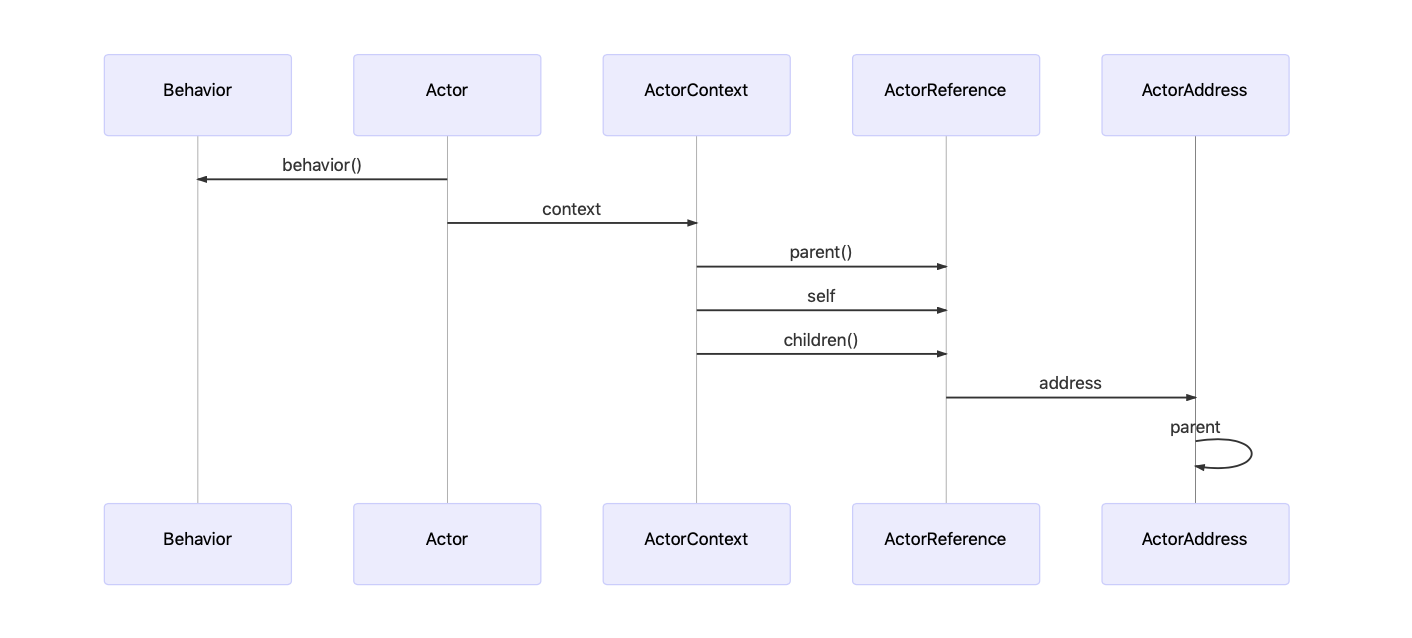Multiplatform Typed Actor System written in Kotlin.
Data relationships has been inspired by Akka System.
typealias CoreReceiver<T> = (Actor<T>, CoreEnvelop<T>) -> Behavior<T>
typealias ProtocolReceiver<T> = (Actor<T>, ProtocolEnvelop<T>) -> Behavior<T>
val core: CoreReceiver<T>
val protocol: ProtocolReceiver<T>
fun onStart(actor: Actor<T>)
fun onStop(actor: Actor<T>)
fun onKill(actor: Actor<T>) val context: ActorContext<T>
infix fun become(protocol: ProtocolBehavior<T>): Behavior<T>
fun behavior(): Behavior<T> = same()
fun same(): Behavior<T>
fun kill() : Boolean infix fun <R> actorFor(property: ActorProperty<R>): ActorReference<R>
infix fun <R> actorFor(protocolReceiver: ProtocolBehavior<R>): ActorReference<R>
fun <R> actorFor(protocol: ProtocolBehavior<R>, name: String): ActorReference<R>
infix fun <R> actorFor(behavior: Behavior<R>): ActorReference<R>
fun <R> actorFor(behavior: Behavior<R>, name: String): ActorReference<R> val self: ActorReference<T>
fun parent(): ActorReference<*>?
fun children(): Collection<ActorReference<*>> val address: ActorAddress
infix fun tell(envelop: Envelop<T>)
infix fun tell(content: T) val name: String
val parent: ActorAddress?
infix fun childOf(address: ActorAddress): Boolean
infix fun parentOf(address: ActorAddress): Booleanval called = atomic("")
val system = Aktor.new("example")
val reference = system.actorFor<String> { a, m ->
called.set(m.content)
a.behavior()
}
reference tell "Hello World!"
// called value should be "Hello World!val called = atomic("")
val system = Aktor.new("example")
val reference = system.actorFor<String> { _, m ->
actor become { a, v ->
called.set("$m.content $v.content")
a.same()
}
}
reference tell "Hello"
reference tell "World!"
// called value should be "Hello World!val called = atomic("")
data class Create(name: String)
val system = Aktor.new("example")
val reference = system.actorFor<Create> { a, e ->
a.actorFor<String>({ b, v ->
called.set("$m.content $v.content")
b.same()
}, e.name)
a.same()
}
reference tell Create("Hello")
// ...data class PingPong(val sender: ActorReference<PingPong>)
fun player(name: String): Receiver<PingPong> = { actor, message ->
println("$name playing ...")
message.content.sender tell PingPong(actor.context.self)
actor.same()
}
fun Game() {
val system = Aktor.new("test")
val ping = system actorFor player("ping")
val pong = system actorFor player("pong")
ping tell PingPong(pong)
}Copyright 2019-2020 D. Plaindoux.
Licensed under the Apache License, Version 2.0 (the "License"); you may not use this file except in compliance with the License. You may obtain a copy of the License at
http://www.apache.org/licenses/LICENSE-2.0
Unless required by applicable law or agreed to in writing, software distributed under the License is distributed on an "AS IS" BASIS, WITHOUT WARRANTIES OR CONDITIONS OF ANY KIND, either express or implied. See the License for the specific language governing permissions and limitations under the License.
